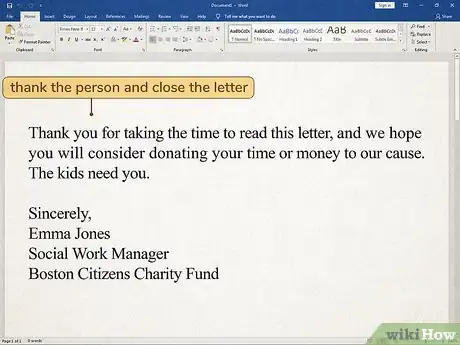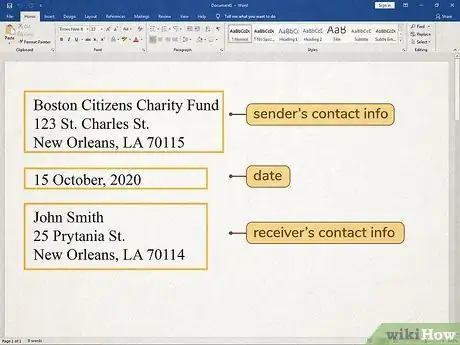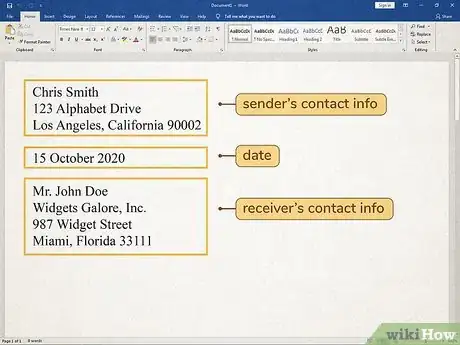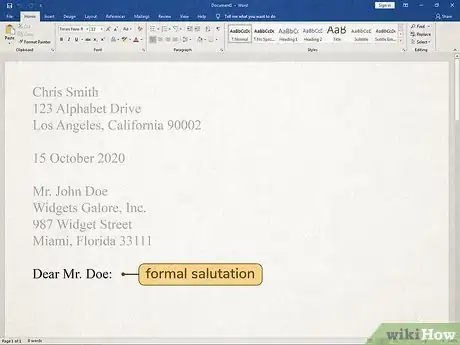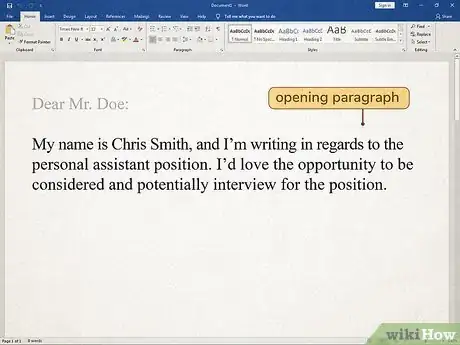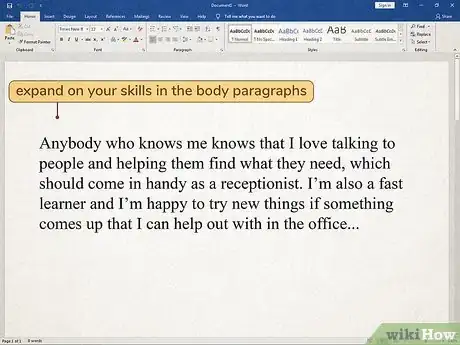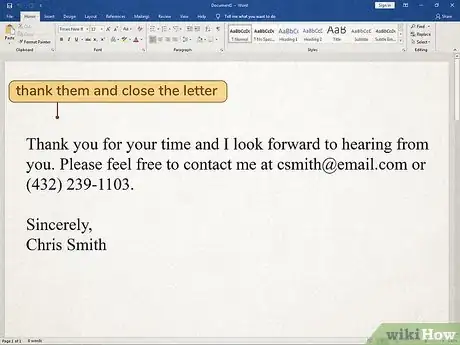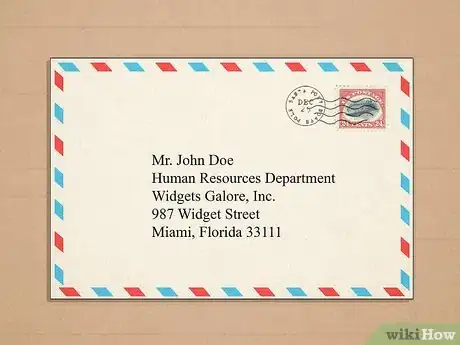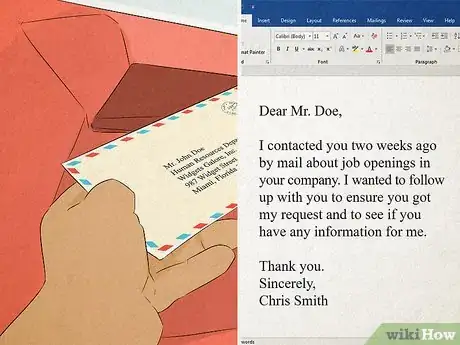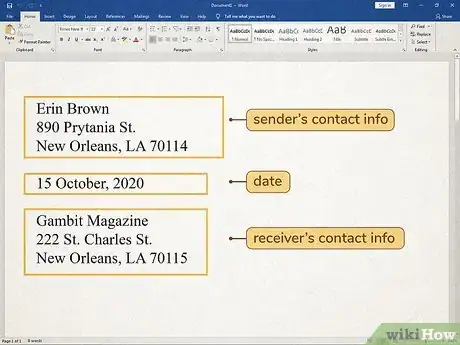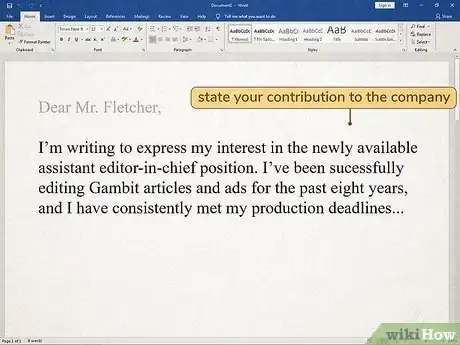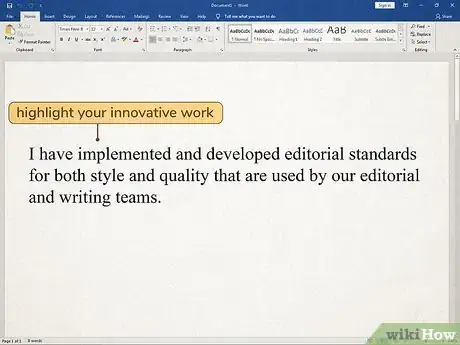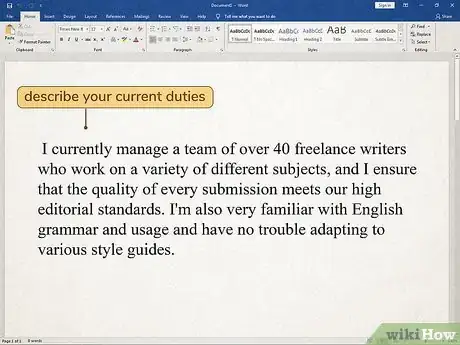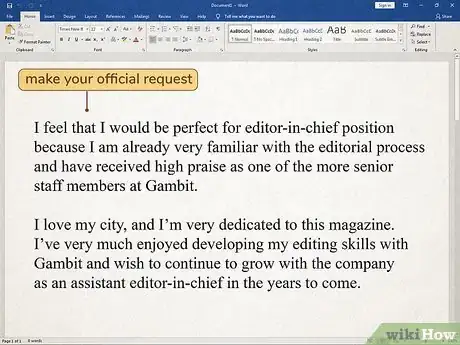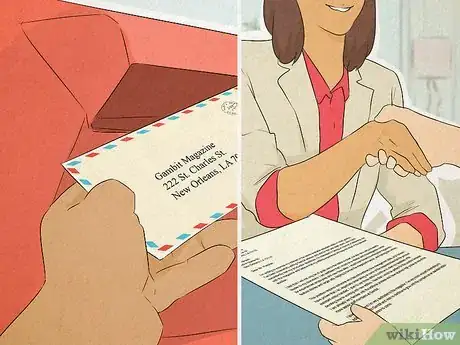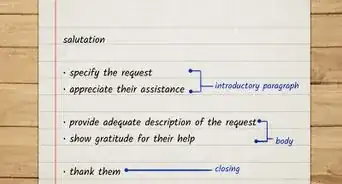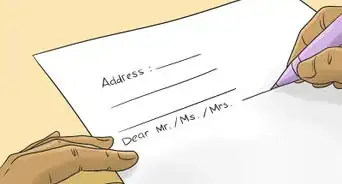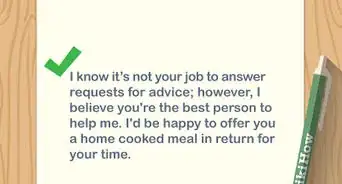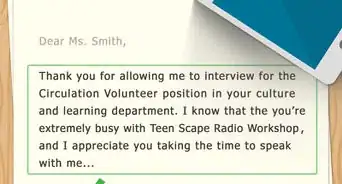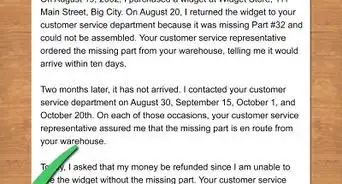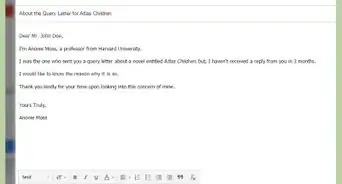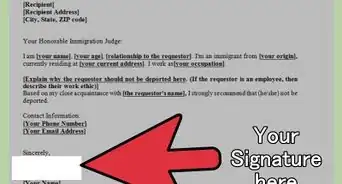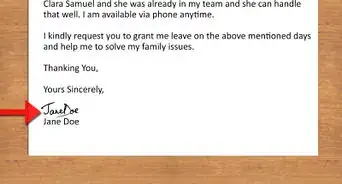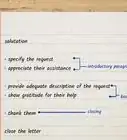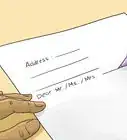This article was co-authored by Michael McCutcheon, PhD. Dr. Michael McCutcheon is a career coach, psychologist, and award-winning public speaker who specializes in procrastination elimination, goal achievement, and increasing life satisfaction. With a background as a counseling psychologist, he guides clients toward becoming more aware of their desires and anxieties to break old patterns, create new habits, and achieve life-changing results. He also helps clients improve organization skills, embark on a new career, get promoted, get admitted into graduate schools, and transition from school to the working world. He is a published author and lecturer in graduate psychology courses at New York University (NYU), a position he has twice won the Teaching Award (2014 & 2019). His work has appeared in the press as a lifestyle and career expert for The Washington Post/The Associated Press, The New York Post, Scholastic, Lifehacker, and The Coca-Cola Company. He has served as a contributing writer for Out Magazine and featured panelist on National Public Radio (NPR).
There are 10 references cited in this article, which can be found at the bottom of the page.
This article has been viewed 164,961 times.
There will come a time when you might need to request something, be it from the company you are working for or a personal need that you have. Taking the time to construct a well-written letter outlining what it is you need could be the thing that guarantees you getting what it is that you want. Here are some suggestions and methods to help you to write a professionally constructed letter.
Steps
Request Letter Templates
Requesting Information or other Assistance
-
1Greet whoever you are writing to. If you know you are writing to, then that is great. Use the proper title such as Ms., Mrs., or Mr. Dear Mrs. and then their name. If you do not know, do some research to see if you can find who it should be directly written to.[1]
- Call the company or location to inquire about who would be best to ask. If you call the main line and tell them what you need, they could be able to direct you in the right way.
- If you cannot find a name, then opt for To Whom it May Concern as your default.
-
2Ask for what you need. The first paragraph should explicitly tell what it is that you are requesting Give as many details as necessary so that the person or company you are asking for knows exactly what you need so they can properly decide whether or not they can fulfill your request.[2]
- Try not to omit any details. You do not want to spring something on them at the last moment and they decide to not go through with your request. You also do not want to make it more difficult at the last minute. This could lead them to deny you for any requests in the future.
- Keep it simple. Do not ask for more than you need. You are requesting a favor, and it would be considered rude to ask for the world when you do not actually need it. Keep your request as simple as you possibly can.
Advertisement -
3Tell why you need and what it will be used for. The second paragraph should focus on what the information or assistance is going to be used for. For instance, if you are asking for a paystub for proof of income in the first paragraph, use this one to state that it is to prove consistent work history for a rental application. This is important so that whoever you are asking knows what their information or request is going to be used for and this could impact their decision.[3]
-
4Thank them for reviewing the request. Being polite and gracious could positively affect their decision if they know you appreciate their help. This could keep your reputation favorable for possible future requests.[4]
- If you are planning on following up, let them know. Let them know the best time to contact you so that they can know when they are able to reach you, as well.
- Do not make it seem as if they have to do what you are asking. This is a request and not a command.
-
5Use a professional letter heading. As always, you want to format your letter correctly. The heading is an important part of this. At the top of the page in the left margin, put your name and contact information such as your phone number and address. Below it should be the address for whoever you are asking for information or assistance from.[5]
- If you are writing for something personal, use your home address. If it is for a job or company you are volunteering for, use the address for the business.
-
6Mail the letter and wait for your response. Now, is when you wait. If you stated you will be following up, do so. If it has been over a week of time, give them a call or direct email to remind them of your request or have them go find your letter in a pile of mail they have not yet reviewed.
- Be considerate of their decision either way. You do not want to burn any bridges in case you need to ask for another request in the future.
- Include a self-addressed, stamped envelope to make it easier for any documents to be sent to you if need be.
Requesting an Interview
-
1Find the company you want to work for. Search job postings to see if anyone is hiring your skill set, but sometimes it can be difficult finding jobs that are out and actively recruiting. There are times when it is best to inquire directly with a desired company as to whether they have any room for your unique set of skills. Figure out which one you are writing the letter for.
- Do research on the company so you can know exactly what it is they do, stand for, and could be looking for in a new employee. This will also help you to tailor your letter to highlight skills that they value.
- Look up employee reviews of the business. You can get a good sense of the work culture and see if it is a good fit for you. If you are laid-back, it might not be a good idea if you see that the company has a strict way of dealing with deadlines. Be wary if you only see good reviews without any of constructive criticism. That could be false advertising initiated by the company themselves.
-
2Format your letter heading. The proper way to format the heading is in the top, left corner. Include your name and contact information such as address, email, and phone number. Beneath that, have the name and contact information for who you are writing to.[6]
- Use a clear, legible font. In the professional world is it best to stick with a clear, concise one such as Times New Roman, Arial, or Calibri.[7]
-
3Use the proper greeting. It is best to have Dear Mr., Ms., or Mrs. followed by the name of the hiring manager. Do your research to find the name of whoever is in charge of hiring or who your letter will hit first. If you cannot find the name, address the letter to Whom It May Concern.[8]
-
4Write your opening paragraph. This is the company’s introduction to you, so make sure to put your best foot forward. Say what position you are applying for and where you saw the job. Also, mention if you were referred by another employee or professional contact. Highlight the skills that are relevant to the position.
- Keep your writing clear and concise. Companies do not want to have to read long, verbose letters. They want to see at a glance whether or not you will be a good fit for their company.[9]
-
5Write the body paragraphs. This is where you can expand on your skills, where you acquired them, and how these will be an asset to the company. If you are working off of a job description, make sure to address the specific qualifications they have outlined. If you do not have a description, work off of the research you have about the company and what you think would suit their needs.
- Include how you would fit in at the company. If you know the job culture, it would be good to say some things about yourself that shows that you would easily assimilate with the company.
- Focus on what you can do for them. Do not say what the company will personally bring you. That will sound like you are just using the company as a stepping stone. Even if this is the case, you should not let this be known. Everything you say should emphasise what you can do for them.
-
6Write your closing paragraph. This is where you thank them for their time in reviewing your letter. You should state that you are available for an interview at their convenience. If you plan on following up with a phone call, let them know in this paragraph.
- Give a proper closing salutation. Best regards or Cordially work well for a professional letter.
-
7Address your envelope to the human resources department or hiring manager. You want to make sure that this letter gets into the right hands and is not lost in all the other mail the company receives.
-
8Mail the letter and follow-up. If the company turns you down for an interview, ask them why. That could be constructive reasons to consider for the next time you apply to a similar job. You might be able to reapply to the job when you have more experience that they are looking for or at a time when they are actually actively hiring.
Requesting a Raise or Promotion
-
1Figure out why you want the raise or promotion. If you have been at the company for a while, it is normal to want a raise or an increase in responsibility. If it is not an automatic benefit that is outlined in your job, you might have to formally ask.[10]
- Ask after you have earned the right to a raise. Do not ask within your first 90 days or before you have really shown your asset and growth within the company. It is unprofessional to inquire about a pay raise or promotion you do not deserve.[11]
-
2Ask your manager or supervisor how to inquire about a raise. Every company has a different policy. If it is a formal letter, then continue with the next steps.
- If it is to ask face-to-face, reference How to Ask for a Pay Raise.
-
3Ask who to address the letter to. Sometimes it is your direct manager, but it could be the human resources department or even the CEO of the company if it is a smaller establishment. Discuss what it is you want with your manager and figure out the proper channels to go about inquiring about it.
- There are times when you might have to send the letter to multiple people like your direct manager or supervisor as well as the human resources department. Be aware of this so that you fulfill all requirements for your request.
- If you talk to your manager and they do not think you are ready for the raise or promotion, listen to them. Ask for constructive criticism and work on their suggestions. Inquire again in a few months when you believe you are more prepared.
-
4Do a proper letter heading. This should include your name and company contact information on the left hand side of the letter, and the name and contact information of whoever you are addressing beneath it by one line break.[12]
-
5State what you have contributed to the company. This will show how you have been beneficial for the efficiency for the company. This is also the place to allude to what you are asking for. This is to show that you have done your job and been an asset, and the raise is well-deserved.[13]
- Maintain your professionalism throughout the letter. It would be easy to become too familiar since you work with this company everyday. Remember that you are addressing your superior.
- If you believe your length of time working at this company warrants a raise or promotion, say that as well. An example is if you worked five years and have never gotten a pay increase or promotion. It is best to tell them all the reasons you believe you deserve what you are asking for.
-
6Tell where you have brought the company growth and in what areas. If you implemented a new program or made a suggestion that positively benefitted the business, this is where to highlight that. Be sure to talk about the results of your innovative work. If it made a department run smoother or resulted in an increase of revenue, say that.[14] Be specific.
-
7Discuss your daily job duties. If you successfully complete your job requirements in a timely and efficient manner, highlight this point. You were hired in to do a job, and you do just that. This further proves your value to the company. It shows you are an integral part of their success.[15]
- Highlight any times you have gone beyond your job duties. For instance, maybe you work overtime to make sure projects are completed in a timely manner or you offer your free time to other departments that could use your assistance. If you are going beyond your job description, tell them that.[16]
- Show pride in your company and that you work there. If you believe in what the company does and that positively influences your attitude toward the job, make that known so that they believe you are a true team player that is there for the long-haul. If you are not as driven in this area, do your best to show any positivity you have for the company.
- Talk about personal characteristics you have that benefit the company. If your professionalism and go-getter attitude works towards things getting done, say that. This is the time to really show how you have shined during your time there.
-
8Make your official request for a pay raise or promotion. You have outlined why you deserve it, now it is time to tell them exactly what you want. If it is a particular amount of money you are looking to make, let them know this. Also, let them know what you will do if you do not get this raise or promotion, such as if you have another job offer that you are considering.
- Be open to negotiation. The company might not believe you deserve all of what you are asking for or not be able to afford it; however, they could be willing to give out a smaller amount.[17] Tell them the highest amount you want, but be open to what they are willing to give.
-
9Close out your letter. Thank them for their time and let them know within what timeframe you will be following up. Do not let it go for more than a week. This gives them time to think over your request, but also make sure that it is considered and reviewed. Include a professional closing salutation and your personal signature.[18]
-
10Mail your letter. Decide whether to use traditional mail or your company’s mail system. It also might be acceptable to hand the letter to your manager personally. Ask around to see what is the best protocol and follow-through.
Community Q&A
-
QuestionIs it necessary to capitalize the greeting in a letter?
 DonaganTop AnswererIt is customary.
DonaganTop AnswererIt is customary.
Warnings
- They might turn you down. Do not be discouraged. You can always make the request at a better time or find another route to go.⧼thumbs_response⧽
Things You'll Need
- Laptop with a word processor
- Pen and paper
- Envelopes
- Stamps
References
- ↑ https://au.indeed.com/career-advice/career-development/sample-letter-of-request
- ↑ https://au.indeed.com/career-advice/career-development/sample-letter-of-request
- ↑ https://ca.indeed.com/career-advice/career-development/how-to-write-request-letter
- ↑ https://ca.indeed.com/career-advice/career-development/how-to-write-request-letter
- ↑ https://www.englishclub.com/business-english/correspondence-information-requesting.htm
- ↑ https://sacd.sdsu.edu/student-ombudsman/writing-an-effective-appeal-or-request-letter
- ↑ http://www.businessnewsdaily.com/5331-best-resume-fonts.html
- ↑ https://sacd.sdsu.edu/student-ombudsman/writing-an-effective-appeal-or-request-letter
- ↑ https://idealistcareers.org/template-requesting-an-interview/
- ↑ https://www.indeed.com/career-advice/career-development/promotion-request-letter
- ↑ https://www.forbes.com/sites/elanagross/2016/06/27/8-managers-share-the-best-way-to-ask-for-a-raise-and-get-it/#4014fb2c74ff
- ↑ https://www.indeed.com/career-advice/career-development/promotion-request-letter
- ↑ Michael McCutcheon, PhD. Career Coach & Psychologist. Expert Interview. 24 February 2021.
- ↑ Michael McCutcheon, PhD. Career Coach & Psychologist. Expert Interview. 24 February 2021.
- ↑ Michael McCutcheon, PhD. Career Coach & Psychologist. Expert Interview. 24 February 2021.
- ↑ Michael McCutcheon, PhD. Career Coach & Psychologist. Expert Interview. 24 February 2021.
- ↑ Michael McCutcheon, PhD. Career Coach & Psychologist. Expert Interview. 24 February 2021.
- ↑ https://ca.indeed.com/career-advice/career-development/promotion-request-letter
About This Article
To write a request letter for an interview, start by including your name and contact details in the top left-hand corner. Next, write an appropriate greeting such as "Dear Mr." or "Dear Mrs.", followed by the hiring manager's name. In your first paragraph, write 2-3 sentences in which you mention your name, the job you're interested in, and where you saw it. For your 2-3 body paragraphs, explain how you gained your skills and how they would benefit the company. Finally, add a concluding paragraph where you say you're available for an interview. To learn how to write a request letter for a raise or a promotion, keep reading!






